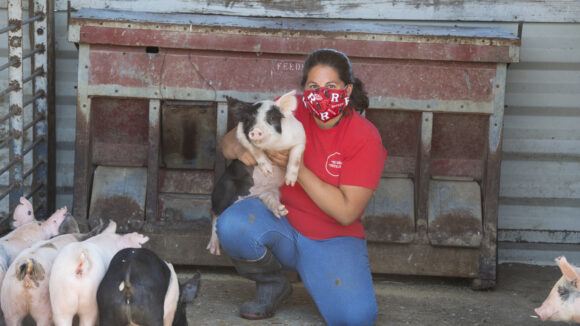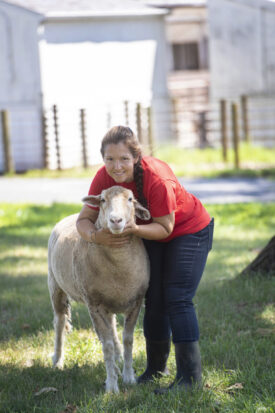
Felicia McCloskey, a senior research animal worker who oversees care and breeding of one of the largest pig herds in New Jersey. Photo: Nick Romanenko
Essential workers at Rutgers have kept the university running and served others who remained on campus while most of the community has been working remotely since March.
They have maintained the buildings and grounds; kept faculty, staff and students connected online; served the hungry and provided other services. Rutgers Today spent some time talking to the workers about how the pandemic has changed their lives and jobs. Their stories are posted on Rutgers Today. One group of essential workers is the caretakers of the animals on the Cook campus farm. Here is their story.
Life at Rutgers Farm
The workers at Rutgers Farm are used to being on campus when most others are gone.
“I’m responsible for animals,’’ said Felicia McCloskey, a senior research animal worker who oversees care and breeding of the pigs on the farm. “That means whether there is a natural disaster or a global pandemic someone has to be here. It gives me a sense of pride to know how essential my job really is.”
The team of nine full-time support staff members who manage the herds on the Cook campus including the cattle, goats and sheep on the farm at Rutgers University-New Brunswick have worked through blizzards and hurricanes that have shut down the university. But this time they had to adjust in more sustained ways.
“At first, being on campus was not much different from a normal winter break, but as time went you could really see the change in the environment,’’ McCloskey said. “Everyone was asked to work from home if their position allowed for it. That made the campus very quiet and at times eerie. I miss seeing the students on campus and the energy they bring.’’
Students usually play a critical role on the farm. Student workers assist with the care of animals. They help socialize the new animals when they are born to help them get used to visitors. The farm staff also teaches classes for animal sciences majors in the School of Environmental and Biological Sciences to give them hands-on experience.

Rebecca Potosky, a senior research animal care tech, oversees care of the sheep and goats and the chicken flock. Photo: Nick Romanenko
This spring the staff found ways to adjust their teaching. Rebecca Potosky, a senior research animal care tech who oversees care of the sheep and goats and the chicken flock, used her camera phone to record and share moments the students were missing.
“I was able to capture a goat giving birth, some treatments, and other routine procedures to share,’’ Potosky said.
“I feel thankful that in this time of uncertainty and so much loss, I am able to continue to work,’’ she said. “I also recognize the importance of my job. Animals need to be fed, cleaned, and taken care of regardless of the situation. Our program provides students with animals for hands-on teaching opportunities that are essential to their future careers, and I am dedicated and proud to continue providing care.’’
Kelly Vuong, a senior research animal worker who manages cattle on the farm, was also able to capture of the birth of a calf on her camera phone to share with students. If it had been normal times, Vuong would have missed it because the cow gave birth over the weekend, when she usually is not at work.
For many of the workers on the farm, the uncertainty that hung over the last day of classes in March is a memory they will never forget.
“I tried to remain calm and reassuring for the students, but it was difficult, especially for the seniors who were so distraught not knowing whether this would be their last day on campus as an undergrad or not. To many students, the farm is an escape, almost a sanctuary, and having that taken away from them was very sad.’’
– Andrea Alexander

